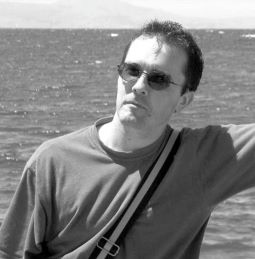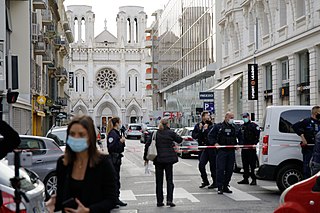ProfessorRohan Gunaratna is a threat specialist of the global security environment. Professor Gunaratna has over 30 years of academic, policy, and operational experience in national and international security. He is Professor of Security Studies at the S. Rajaratnam School of International Studies, Nanyang Technology University, Singapore.

The General Directorate for Internal Security is a French security agency. It is charged with counter-espionage, counter-terrorism, countering cybercrime and surveillance of potentially threatening groups, organisations and social phenomena.

The General Directorate for Territorial Surveillance, is the civilian domestic intelligence service of Morocco. It is tasked with the monitoring and anticipation of potentially subversive domestic activities.

Operation Barkhane was a counterinsurgency operation that started on 1 August 2014 and formally ended on 9 November 2022. It was led by the French military against Islamist groups in Africa's Sahel region and consisted of a roughly 3,000-strong French force, which was permanently headquartered in N'Djamena, the capital of Chad. The operation was led in co-operation with five countries, all of which are former French colonies that span the Sahel: Burkina Faso, Chad, Mali, Mauritania and Niger. Mali was a part of the operation until August 2022. The countries are collectively referred to as the "G5 Sahel". The operation was named after a crescent-shaped dune type that is common in the Sahara desert.

Emmanuel Jean-Michel Frédéric Macron is a centrist French politician who has been serving as the 25th president of France since 2017 and ex officio one of the two co-princes of Andorra. He previously was Minister of Economics, Industry and Digital Affairs under President François Hollande from 2014 to 2016 and Deputy Secretary-General to the President from 2012 to 2014. He has been a member of Renaissance since he founded it in 2016.

Islamic terrorism has been carried out in Europe by the jihadist groups Islamic State (ISIL) or Al-Qaeda as well as Islamist lone wolves since the late 20th century. Europol, which releases the annual EU Terrorism Situation and Trend report (TE-SAT), used the term "Islamist terrorism" in reports for the years 2006–2010, "religiously inspired terrorism" for the years 2011–2014, and has used "jihadist terrorism" since then. Europol defines jihadism as "a violent ideology exploiting traditional Islamic concepts".
On 4 September 2016, a car containing seven canisters of gas and pages with Arabic writing was found parked near Notre-Dame de Paris cathedral in Paris.
Renaissance (RE) is a political party in France that is typically described as liberal and centrist or centre-right. The party was originally known as En Marche ! (EM) and later La République En Marche !, before adopting its current name in September 2022. RE is the leading force of the centrist Ensemble coalition, coalesced around Emmanuel Macron's original presidential majority.

Brigitte Marie-Claude Macron is a French former teacher known for being the wife of Emmanuel Macron, the current president of France and co-prince of Andorra.

On 20 April 2017, three French National Police officers were shot by Karim Cheurfi, a French national wielding an AK-47 rifle on the Champs-Élysées boulevard in Paris. One officer, French National Police Captain Xavier Jugelé, was killed and two other French National Police officers and a German tourist were seriously wounded. Karim Cheurfi was then shot dead by police. Amaq News Agency, which is linked to the Islamic State of Iraq and Syria (ISIS), claimed the attacker was an ISIS fighter. French police and prosecutors are investigating the attack as terrorism, and have launched a counter-terrorism prosecution.
On 6 June 2017, at around 16:00 CET, French police shot a man who attacked a police officer with a hammer outside Notre-Dame de Paris cathedral on the Île de la Cité, located in the centre of Paris. The man injured the officer with the hammer, and was found to be in possession of kitchen knives. French police opened a terrorism investigation.

Pierre de Bousquet de Florian was the head of the newly formed French National Centre for Counter Terrorism, an agency charged with monitoring and preventing terrorism in France, from the agency's establishment in 2017 to before being succeeded by Laurent Nuñez in 2020. Bousquet also headed the Direction de la surveillance du territoire from 2002-2007. Since leaving public service he has moved into the private sector in a senior advisory role at a consultancy firm.

Since Emmanuel Macron was elected President of France on 7 May 2017, a series of protests have been conducted by trade union activists, left-wing activists and right-wing activists in opposition to what protesters consider to be neoliberal policies and globalism, his support of state visits by certain world leaders, his positions on French labour law reform, as well as various comments or policy proposals he has made since assuming the presidency.
Sarah Halimi was a retired French doctor and schoolteacher who was attacked and killed in her apartment on 4 April 2017. Circumstances surrounding the killing—including the fact that Halimi was Jewish, and that the assailant had shouted Allahu akbar during the attack and afterward proclaimed "I killed the Shaitan"—cemented the public perception, particularly among the French Jewish community, that it was a stark example of antisemitism in modern France.
On 12 May 2018, a 20-year-old Chechnya-born French citizen, armed with a knife, killed one pedestrian and injured four others near the Palais Garnier opera house in Paris, France, before being fatally shot by police. The stabbings were in the area of Rue Saint-Augustin and Passage Choiseul. French President Emmanuel Macron said France had "paid once again the price of blood but will not cede an inch to the enemies of freedom." The suspect, identified as Khamzat Azimov, had been on a counter-terrorism watchlist since 2016. Amaq News Agency posted a video of a hooded person pledging allegiance to Islamic State of Iraq and the Levant (ISIL) leader Abu Bakr al-Baghdadi, claimed to be the attacker. Europol classified the attack as jihadist terrorism.

On 15 April 2019, just before 18:20 CEST, a structural fire broke out in the roof space of Notre-Dame de Paris, a medieval Catholic cathedral in Paris, France. By the time the fire was extinguished, the cathedral's wooden spire (flèche) had collapsed, most of the wooden roof had been destroyed, and the cathedral's upper walls were severely damaged. Extensive damage to the interior was prevented by the vaulted stone ceiling, which largely contained the burning roof as it collapsed. Many works of art and religious relics were moved to safety, but others suffered smoke damage, and some of the exterior art was damaged or destroyed. The cathedral's altar, two pipe organs, and three 13th-century rose windows suffered little or no damage. Three emergency workers were injured. The fire contaminated the site and nearby areas of Paris with toxic dust and lead. Notre-Dame did not hold a Christmas Mass in 2019, for the first time since 1803. Investigators in 2020 believed the fire to have been "started by either a cigarette or a short circuit in the electrical system".

On 3 October 2019, a police employee at the Paris police headquarters stabbed four of his colleagues to death and injured two others. He was shot dead by police at the scene.

On 16 October 2020, Samuel Paty, a French secondary school teacher, was attacked and killed in Éragny-sur-Oise, Île-de-France, France, by an Islamist terrorist.

On the morning of 29 October 2020, three people were killed in a stabbing attack at Notre-Dame de Nice, a Roman Catholic basilica in Nice, France. The alleged attacker, Tunisian man Brahim Aouissaoui, was shot by the police and taken into custody. Both French President Emmanuel Macron and the mayor of Nice, Christian Estrosi, said it was a terrorist attack attributed to Islamic extremism.













